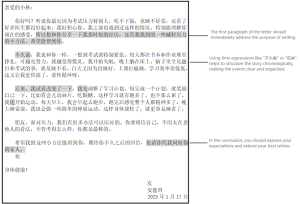In the IB Chinese B SL exam, one common writing task is to write an informal letter. Writing an informal letter involves a more relaxed, friendly tone and is usually addressed to a friend or family member. In this blog post, we will guide you on how to write a successful letter and use a sample queition to demonstrate the key strategies.

1. Learning from the Sample
In the IB Chinese B SL exam, letter writing tasks assess your ability to communicate in a personal, engaging manner, often requiring you to provide advice, share experiences, or express emotions. The key is to maintain a conversational tone while organizing your ideas clearly and effectively.
Now, let’s explore a sample question and a corresponding model letter to better understand the approach.

2. Breaking Down the Structure and Writing Techniques
Let’s break down this letter to understand how it’s structured and how the writer uses language to connect with the reader.
- Greeting: The writer starts with a warm greeting, “亲爱的小林” (Dear Xiaolin), and immediately shows concern for the friend’s well-being by acknowledging the stress they are experiencing.
- Body:
- Describing the Problem: The writer clearly explains the problem by noting the physical and emotional toll that exam stress is taking on the friend, including sleep issues and a lack of appetite. This helps the reader understand the gravity of the situation.
- Sharing Personal Experience: The writer then shares their own experience with exam stress, stating, “我之前也遇到过这样的情况” (I have also experienced this before). This personal connection makes the advice more relatable and trustworthy.
- Offering Practical Solutions: The writer offers concrete advice, such as adjusting the study plan, rewarding oneself after completing tasks, and exercising regularly. These solutions are specific and actionable, which makes them more helpful.
- Closing: The letter ends with encouragement and well-wishing. The writer reassures the friend that they are capable of handling the situation, saying “你都是最棒的” (You are the best). This positive tone is essential to leave the friend feeling uplifted and supported.
3. Tips for Writing a Successful Letter
- Be Personal and Relatable: Sharing personal experiences, like the writer does in the sample letter, creates a connection with the reader. It shows empathy and helps the reader feel understood.
- Give Specific Advice: Rather than offering vague advice, like 放轻松(just relax), provide clear and actionable suggestions, like 你可以通过听音乐来放松(You can relax by listening to music). This makes your advice more useful and demonstrates your problem-solving skills.
- Keep the Tone Friendly: The tone of your letter should reflect your relationship with the recipient. For a friend, the language should be warm, supportive, and encouraging. Avoid formal or overly complex language.
- Structure Clearly: Organize your letter with a clear introduction, body, and conclusion. This helps your reader follow your points and makes your letter easier to read.
Writing a letter in the IB Chinese B exam gives you the opportunity to showcase your language skills while expressing empathy and offering advice. By following the structure outlined above and using specific examples like those in the sample letter, you can create a well-organized and engaging letter.
If you are interested in having your kid learn Chinese, sign up for a free trial class via the form in this page, and we will be happy to help.



